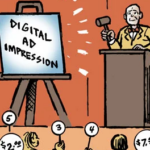Whereas Facebook seems to have outgrown its app developer platform, Parse, Twitter more likely shut down its dev toolkit Fabric in a bid to slim down and focus on its future survival.
In January, Twitter sold Fabric to Google and Facebook officially pulled its support of Parse one year after announcing its intention to do so.
But back in the day, Facebook and Twitter were banking on developers.
Parse and Fabric were both established at a time when Facebook and Twitter were desktop-centric businesses and it was “unclear whether they’d make the mobile transition successfully,” said Apsalar CEO Michael Oiknine.
“They saw these programs as a way to get their ‘fair share’ of innovation and ad spend,” Oiknine said. “When you help developers, they innovate on your platform.”
Or at least that’s the plan. Providing tools to the developer community is a way for platforms to “build goodwill” with app publishers before they blow up in the hopes they’ll end up using the platform’s ad product, said mParticle CEO Michael Katz.
“The problem is that only a small percentage of these businesses get big enough to need to spend money on their ad products, so they remain cost centers,” Katz said.
According to Katz, Twitter’s Fabric was losing roughly $4 million or $5 million a month, and Facebook’s Parse also was losing money.
“Everyone wants to give away tools to developers and think monetization will come later,” Katz said. “But nobody likes losing $50 million a year to support something that may or may not work out.”
From Facebook’s perspective, however, there’s no longer a need to sweeten the deal. Its mobile ad offerings are honey enough to attract app developers to monetize on its platform, whether that’s in the news feed, on Instagram or through Facebook Audience Network, said Undertone co-founder Eric Franchi.
Owning and supporting Parse just didn’t make “strategic sense anymore,” Franchi said.
Facebook is focusing its efforts on growing its user base, personalizing its ad products and going after the television market, and “it’s not clear how developer tools play into those and other key strategic goals,” he said.
Twitter, on the other hand, is a company “exploding at the seams,” said Dave Bell, founder of mobile analytics company Gummicube, and it needs “to make decisions about what to focus on, most likely with an eye to becoming more focused and attractive to a potential acquirer.”
There’s just not enough direct upside for Twitter to keep Fabric under its wing, said Gil Dudkiewicz, CEO and co-founder of StartApp. Maintaining a one-stop shop for developers is expensive and time-consuming, and Twitter has other fish to fry as user growth continues to stall, monetization fails to ignite and executives exit in droves.
“Twitter is trying to focus on core values and products and cutting costs, which, for them, is now more important than ever,” Dudkiewicz said.
While Twitter focuses on its future existence, Facebook is focusing on the future in general, Bell said.
“Facebook needs to focus on where the hockey puck is going and not where it is today or where it was yesterday,” Bell said. “To them, Parse was transactional, whereas things like Oculus are transformational.”














